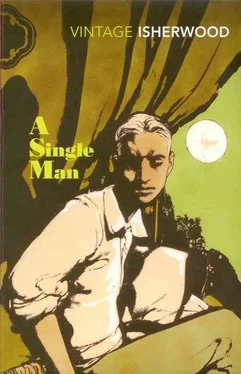Kenny laughs, ‘I already lost mine!’
And now an hour, maybe, has passed. And they are both drunk; Kenny fairly, George very. But George is drunk in a good way, and one that he seldom achieves. He tries to describe to himself what this kind of drunkenness is like. Well – to put it very crudely – it’s like Plato; it’s a Dialogue. A dialogue between two people. Yes, but not a Platonic dialogue in the hair-splitting, word-twisting, one-up-to-me sense; not a mock-humble bitching-match; not a debate on some dreary set theme. You can talk about anything and change the subject as often as you like. In fact, what really matters is not what you talk about, but the being together in this particular relationship. George can’t imagine having a dialogue of this kind with a woman, because women can only talk in terms of the personal. A man of his own age would do, if there was some sort of polarity; for instance, if he was a Negro. You and your dialogue-partner have to be somehow opposites. Why? Because you have to be symbolic figures – like, in this case, Youth and Age. Why do you have to be symbolic? Because the dialogue is by its nature impersonal. It’s a symbolic encounter. It doesn’t involve either party personally. That’s why, in a dialogue, you can say absolutely anything. Even the closest confidence, the deadliest secret, comes out objectively as a mere metaphor or illustration, which could never be used against you.
George would like to explain all of this to Kenny. But it is so complicated; and he doesn’t want to run the risk of finding that Kenny can’t understand him. More than anything, he wants Kenny to understand; wants to be able to believe that Kenny knows what this dialogue is all about. And really, at this moment, it seems possible that Kenny does know. George can almost feel the electric field of the dialogue surrounding and irradiating them. He certainly feels irradiated. As for Kenny, he looks quite beautiful. Radiant with rapport is the phrase which George finds to describe him. For what shines out of Kenny isn’t mere intelligence or any kind of switched-on charm. There the two of them sit, smiling at each other – oh, far more than that – fairly beaming with mutual insight.
‘Say something,’ he commands Kenny.
‘Do I have to?’
‘Yes.’
‘What’ll I say?’
‘Anything. Anything that seems to be important, right now.’
‘That’s the trouble. I don’t know what is important and what isn’t. I feel like my head is stopped up with stuff that doesn’t matter – I mean, matter to me.’
‘Such as —’
‘Look, I don’t mean to be personal, Sir – but – well, the stuff our classes are about —’
‘That doesn’t matter to you?’
‘Jesus Christ, Sir – I said I wasn’t being personal! Yours are a whole lot better than most; we all think that. And you do try to make these books fit in with what’s going on, nowadays – only, it’s not your fault, but – we always seem to end up getting bogged down in the Past; like this morning, with Tithonus. Look, I don’t want to pan the Past; maybe it’ll mean a whole lot to me when I’m older. All I’m saying is, the Past doesn’t really matter to most kids my age. When we talk like it does, we’re just being polite. I guess that’s because we don’t have any pasts of our own – except stuff we want to forget, like things in high school, and times we acted like idiots —’
‘Well, fine! I can understand that. You don’t need the Past, yet. You’ve got the Present.’
‘Oh, but the Present’s a real drag! I just despise the Present – I mean, the way it is right now – I mean, tonight’s an exception, of course – What are you laughing at, Sir?’
‘Tonight sí ! The Present – no !’ George is getting noisy. Some people at the bar turn their heads. ‘Drink to Tonight!’ He drinks, with a flourish.
‘Tonight – sí !’ Kenny laughs and drinks.
‘Okay,’ says George. ‘The Past – no help! The Present – no good! Granted! But there’s one thing you can’t deny: you’re stuck with the Future. You can’t just sneeze that off.’
‘I guess we are. What’s left of it. There may not be much, with all these rockets —’
‘Death.’
‘Death?’
‘That’s what I said.’
‘Come again, Sir. I don’t get you.’
‘I said Death. I said, do you think about Death a lot?’
‘Why, no. Hardly at all. Why?’
‘The Future – that’s where Death is.’
‘Oh – yeah. Yeah – maybe you’ve got a point there.’ Kenny grins. ‘You know something? Maybe the other generations before us used to think about Death a lot more than we do. What I mean is, kids must have gotten mad, thinking how they’d be sent out to some corny war and killed, while their folks stayed home and acted patriotic. But it won’t be like that, any more. We’d all be in this thing together.’
‘You could still get mad at the older people. Because of all those extra years they’ll have had, before they get blown up.’
‘Yes, that’s right, I could, couldn’t I? Maybe I will. Maybe I’ll get mad at you, Sir.’
‘Kenneth —’
‘Sir?’
‘Just as a matter of the purest sociological interest, why do you persist in calling me Sir?’
Kenny grins teasingly. ‘I’ll stop if you want me to.’
‘I didn’t ask you to stop. I asked you why.’
‘Why don’t you like it? None of you do, though, I guess.’
‘You mean, none of us old folks?’ George smiles a no-hard-feelings smile. Nevertheless, he feels that the symbolic relationship is starting to get out of hand. ‘Well, the usual explanation is that we don’t like being reminded —’
Kenny shakes his head decisively. ‘No.’
‘What do you mean, No?’
‘You’re not like that.’
‘Is that supposed to be a compliment?’
‘Maybe. . . . The point is, I like calling you Sir.’
‘You do?’
‘What’s so phoney nowadays is all this familiarity. Pretending there isn’t any difference between people – well, like you were saying about minorities, this morning. If you and I are no different, what do we have to give each other? How can we ever be friends?’
He does understand, George thinks, delighted. ‘But two young people can be friends, surely?’
‘That’s something else again. They can, yes, after a fashion. But there’s always this thing of competition, getting in the way. All young people are kind of competing with each other, do you know that?’
‘Yes, I suppose – unless they’re in love.’
‘Maybe they are, even then. Maybe that’s what’s wrong with —’ Kenny breaks off abruptly. George watches him, expecting to hear some confidence about Lois. But it doesn’t come. For Kenny is obviously following some quite different train of thought. He sits smiling in silence for a few moments and – yes, actually – he is blushing! ‘This sounds as corny as hell, but —’
‘Never mind. Go ahead.’
‘I sometimes wish – I mean, when you read those Victorian novels – I’d have hated living in those days, all except for one thing – Oh, hell – I can’t say it!’ He breaks off, blushing and laughing.
‘Don’t be silly!’
‘When I say it, it’s so corny, it’s the end! But – I’d have liked living when you could call your father Sir.’
‘Is your father alive?’
‘Oh, sure.’
‘Why don’t you call him Sir, then? Some sons do, even nowadays.’
‘Not my father. He isn’t the type. Besides, he isn’t around. He ran out on us, a couple of years ago. . . . Hell!’
‘What’s the matter?’
‘What made me tell you all that? Am I drunk or something?’
Читать дальше












